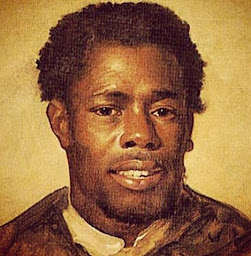Harriet Tubman
Harriet Tubman was born in 1820 to a family of 11 children. Her maiden name is Araminta Ross, but she was nicknamed Minty as a teenager. She would later adopt the name "Harriet after her mother: Harriet Ross.
Her father was Benjamin Ross, who was a free man. Her mother was Harriet Greene Ross, a slave on the Joseph Brodess plantation on Maryland's Eastern Shore. After Joseph died, Edward Brodess took over in 1824. To generate more income, he sold most of his slaves off, especially women in their childbearing years, causing Harriet's two sisters to be sold off.
As soon as she was old enough to work, she was hired out to local farmers. She was extremely defiant. Therefore she was abused and treated poorly; after being overworked, she was often exhausted, ill, and beaten.
The worse abuse she received was from a woman who would whip her to stay awake all night rocking an infant so they would not cry. Her loving mother would care for the baby and nurse the baby to be healthy. Harriet hated to take orders, so her parents wanted her to work as a house slave. She worked indoors for 7 years but eventually was hired as a field worker. This what she wanted because she believed no one would bother her on the fields when she worked well.
When Harriet was 14 or 15, an overseer hit her on the head with a two-pound lead weight. He did this because she blocked his path as he chased a slave, trying to escape a beating. This caused her to experience seizures and sleeping issues.
Over the course of her childhood, tension over slavery increased, causing the white patrol to be more strict and brutal to any slave out after dark or without a pass. This tension increased by the number of slave revolts happening around the world.
In 1849, Harriet Tubman planned to escape from slavery by fleeing to Philadelphia. She decided her escape after the illness and death of her owner. Tubman feared this would put her family in danger, and she was scared for her own life as an unhealthy slave.
Harriet Tubman traveled 90 miles using the Underground Railroad to Philadelphia. She crossed into this free state with a feeling of relief and amazement. The Underground Railroad was the network of men and women helping slaves escape to free land. In the 1700s's this way of traveling had begun to take off. Whites, often Quakers and Methodists, would free blacks who believed slavery was wrong. They provided safe homes on the road to freedom.
"When I found I had crossed that line, I looked at my hands to see if I was the same person. There was such a glory over everything; the sun came like gold through the trees and over the fields, and I felt like I was in Heaven.
Harriet wanted to rescue her family and others living in slavery. Her niece, Kessiah, and her small kids were going to be sold. Kessiah's husband, a free black man named John Bowley, won his wife at the auction. Harriet then helped the entire family make their escape journey to Philadelphia. Harriets leadership earned her the nickname "Moses." Over time, she lead her parents, siblings, and about 60 other people to freedom. However, Harriet's husband, John, did not escape and preferred to live in Maryland with his new wife.
In 1850, a new law called the Fugitive Slave Law was declared. This law stated that the escaped slaves could be captured in the North and revert back to slavery. This caused the abductions of former slaves and free blacks living in free states.
Throughout her life, Harriet believed that God was always on her side. The source of her bravery came from her faith in God as the deliverer and protector of the weak.
From my point of view, Harriet Tubman was phenomenal because she overcame hostilities to denote determination and will forever be known for her fearlessness. She will always be an inspiration to the world. Harriet Tubman escaped slavery herself and become an abolitionist. By directing people to the Underground Railroad, she helped thousands of enslaved people be free from slavery.
Citations: Website: "Harriet Tubman." Bio.com. A&E Networks Television, n.d. Web. 17 Oct. 2014 http://www.biography.com/people/harriet-tubman-9511430#synopsis
Website: "Harriet Tubman." PBS.PBS, n.d Web.17 Oct 2015 http://www.pbs.org/wgbh/aia/part4/4p1535.html
Website: History.com editors January 27th 2021 Harriet Tubman: Facts, Underground Railroad & Legacy - HISTORY
Website: Britannica "Harriet Tubman" Written by The editors of Britannica Harriet Tubman | Biography, Facts, & Underground Railroad | Britannica






Comments
Post a Comment